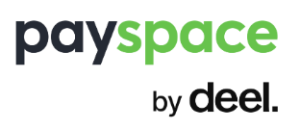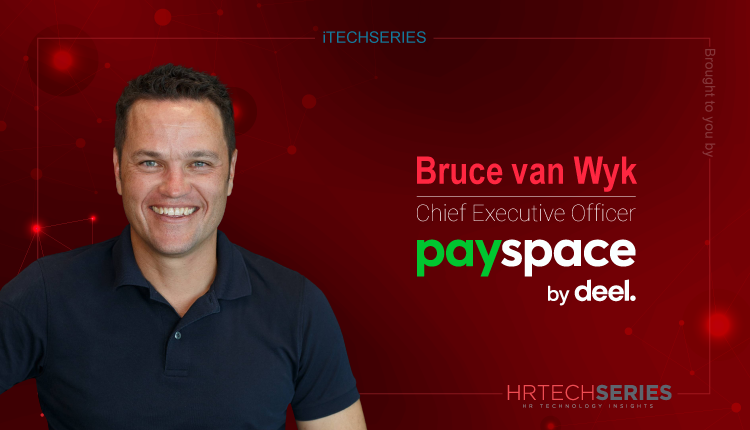Leading payroll and compliance provider, Deel, recently acquired PaySpace, a market leader in cloud-native payroll and HR software solutions; HRTech Series caught up with Bruce van Wyk to discuss the impact of this acquisition:
_________
Hi Bruce, take us through your HRTech journey and PaySpace’s story over the years: we’d love to hear more about PaySpace’s acquisition by Deel and what’s in store in the near-future?
We established PaySpace in 2002 with the intention of disrupting the then 40+ year-old payroll and HR software industry. It was characterized by error-prone manual processes, delays, data corruption, and compliance issues. We knew that radical disruption was required and that tech was our vehicle to do this. We architected a cloud-native single instance, multi-tenant technology stack, building toolsets to navigate the increasingly complex and regulated environment. We designed PaySpace to provide multi-country payroll and HR functionality with built-in compliance to organizations of all sizes and industry sectors. The software was built to be configurable, which gives it scalability and the ability for faster rollout – we weren’t reliant on lengthy development timelines for customization.
It’s ultimately this cloud-native architecture and tech stack that led us to Deel, who was using the PaySpace platform to process payroll for customers in 10 African countries.
Deel’s acquisition of PaySpace was the first time that a (relatively) young employer-of-record (EOR) vendor bought a payroll provider (rather than the other way around). And that’s a game changer! What we’ve seen in the past is payroll vendors adding EOR services to their portfolio by setting up partnerships or acquiring EOR vendors.
Catch more HRTech Insights: HRTech Interview with Jonathan Leaf, CRO at BambooHR
When companies grow and have larger employee numbers, they typically switch from using an EOR to a payroll vendor. Deel as an EOR/global HR platform will integrate the PaySpace tech stack, giving it the ability to run the payroll engine, eliminating the need for intermediaries. This move should also improve service delivery to existing customers. Rather than lose customers when they scale beyond EOR requirements, Deel can now continue to service them directly through PaySpace SaaS in a seamless move.
Previously, a single, global payroll platform with configuration, scalability, and compliance across all sizes and locations seemed like a distant dream. Costs, resources, and knowledge required to maintain such a framework were significant.
We envision a future with a single, unified payroll platform – “one calculator for the world” – offering a seamless experience for all company and employee types and geographies. This empowers companies to grow their teams and operations anywhere in the world.
What are some of the global HRTech trends that have piqued your interest off late?
There are so many! To name just a few…
- The acceleration and continued proliferation of remote work. Covid gave rise to work-from-anywhere, and this remains a growing reality – today’s world of work is increasingly more global and more distributed than ever before. One of the reasons Deel has been able to grow like it has is because they spotted the gaps in remote work and the need to unlock unnecessary, location-based barriers to economic opportunity.
- How the “how” and “where” people are employed and paid has the potential to change laws through lobbying.
- Advances in payroll technology. For example, payroll add-on services have historically been limited by the lack of technology. But APIs and webhooks now make it possible to offer options like earned wage access (EWA) to employees through third parties on your own payroll system.
- The big one: AI. So many interesting HR-related use cases and nuances continue to emerge. One top-of-mind example: We’ve seen great results using AI to interpret compliance requirements and streamline reporting. However, according to recent research from Deel, only 2 in 5 (38%) HR decision makers currently employ AI in their practices and workflow, while 70% of non-AI users say they’re unlikely to implement it within the next 12 months, highlighting a gap in understanding and acceptance.
How are you noticing leading companies streamline their payroll and employee culture with new age HRTech and processes: a few pointers to share with our readers?
We’ve harnessed social media tools like WhatsApp for employee self-service, and made the shift to self-service. This places less reliance and burden on people teams, with employees able to view and download payslips, check leave balances and apply for leave, submit expense claims, and more.
By using tools like WhatsApp, we’re meeting employees where they’re at. Why develop something new when you can harness existing platforms and integrate?
Especially with the recent explosion of generative AI, we’re seeing more and more companies look to AI to automate a variety of services. To meet that demand, Deel just announced the general availability release of Deel AI, its global work assistant that allows users to double-check compliance rules, dig into their global workforce data, and make smarter business decisions faster using AI. Ultimately, faster access to services for employees reduces the burden on HR and payroll teams, and vastly improves turnaround times.
What are some of the biggest challenges to B2B SaaS payroll management that you’d like to highlight here with best practices?
SaaS comes with benefits that traditional desktop and legacy systems just can’t match. So with the right provider, SaaS payroll management shouldn’t be much of a challenge. If anything, training on a new system is the challenge. That’s why we focus on providing an easy-to-use UI.
People are creatures of habit and the reticence in changing to new software lies in the unknown. We’ve been deliberate in ensuring ease of use of the system and designing training modules that get new users up to speed quickly.
In what ways are you seeing AI impact HR and HRTech? A few top highlights?
I heard an interesting statement recently that resonated with me: “It’s not about AI replacing people, it’s about people who use AI replacing those who don’t.”
AI should be seen as a co-pilot, a tool to augment. The questions to ask are, “Where is it applicable in payroll and how can we harness its capabilities? What is it good at? Where does it fit in?”
We’re seeing AI in action with payroll, where AI excels at handling large datasets. For instance, AI can analyze vast amounts of legislative and compliance data, identifying variances in payroll calculations across locations.
We’re using AI to deliver variance reports in the gross-to-net (G2N) calculations – it picks up the variance and the reason for the variance. AI is also being tested for automating repetitive tasks like data entry in managed services.
However, human expertise remains crucial for interpreting these variances due to factors like regional variations in regulations and definitions.
At PaySpace, we’re working to distinguish between AI analyzing volumes of data vs. the capabilities of our calculation engine. The calculations are based on statutory requirements of the tax authority in every country. The nuances of legislations are so complex with constant permutations that need to be interpreted, updated, and applied to the calculation engine. And with AI being used for compliance but still needing human moderation and interpretation, it isn’t yet at the point of accurate calculations for payroll.
In the back-end of our calculation engine, we’re currently testing AI OCR (optical character recognition). It interprets PDF documents provided by the revenue authorities, delivering all the report templates required for reporting by that specific authority. Our engineers can then map the relevant fields in the system back-end to the required fields on the template. Eventually, developers will no longer need to map and configure templates, reducing the resource requirement to build localized reports.
Five predictions and thoughts about the future of HR and HRTech before we wrap up?
- The future of HR promises a powerful marriage of human-centered focus and technological innovation. We can expect AI to take over mundane tasks like screening resumes, freeing HR professionals to focus on building relationships and strategic workforce planning.
- Data-driven insights will be king, with HR tech providing real-time analytics to optimize everything from recruitment to performance management.
- Hyper-personalization will be at the forefront, with learning and development tailored to individual needs and career goals.
- The continued rise of hybrid and remote work will necessitate a continued emphasis on technology that fosters collaboration and a strong company culture, even across physical distances.
- Finally, diversity, equity, and inclusion (DEI) initiatives will be significantly bolstered by HR tech, ensuring fair and data-driven practices throughout the employee lifecycle.
Read More on Hrtech : HRTech Interview with Charlotte Dales, Co-founder and CEO at Inclusively
[To share your insights with us, please write to psen@itechseries.com ]
Bruce van Wyk is a tech entrepreneur and global payroll pioneer. PaySpace, the company he co-founded, was recently acquired by global HR leader, Deel to be integrated as their exclusive payroll calculation engine. The acquisition is Deel’s largest to date and represents an enormous step toward their goal of being the one-stop-shop for all things global payroll & HR.
An IT graduate, van Wyk’s career started in software development, designing, conceptualizing and implementing functional payroll and HR solutions for various local, multinational and blue-chip organizations. Throughout his career, he has solved complex payroll requirements for customers gaining critical insights into the receiving end of the payroll and HR product world, before applying that experience and expertise to PaySpace. His experience in solution design, comprehensive international tax legislation, quality human resource approaches, talent trends and client relations will be put to good use as he assumes the role of PaySpace CEO. Leading a multi-country team, his remit is to drive and deliver to Deel’s global payroll ambitions.
By acquiring and integrating PaySpace, Deel will be the first EOR with its own multi-country global payroll calculation engine, as well as a standalone subsidiary headed by van Wyk to fast-track country localisation in multiple territories beyond Africa and the Middle East. These countries include Brazil, the UK, Canada, Mexico, Australia and Singapore over the next couple of years.
 Architected in the cloud, PaySpace’s proprietary payroll technology is scalable, configurable, highly secure, and easy-to-use allowing anytime, anywhere access to empower payroll and HR teams. It is highly secure and drives operational efficiency, offering self-serve payroll or payroll outsourced to a team of in-house PaySpace payroll experts.
Architected in the cloud, PaySpace’s proprietary payroll technology is scalable, configurable, highly secure, and easy-to-use allowing anytime, anywhere access to empower payroll and HR teams. It is highly secure and drives operational efficiency, offering self-serve payroll or payroll outsourced to a team of in-house PaySpace payroll experts.
PaySpace was specifically designed to provide multi-country payroll and HR functionality with built-in compliance for organizations of all sizes and industry sectors. It provides a single truth for payroll and HR data – and the tools to make strategic decisions at every level. PaySpace has expanded into 40+ African countries as well as the United Kingdom and the Middle East, with an imminent launch in Brazil. PaySpace, acquired by Deel in their largest acquisition to date in 2024, will be integrated as Deel’s exclusive payroll calculation engine. This represents an enormous step toward their goal of being the one-stop-shop for all things global payroll & HR.

